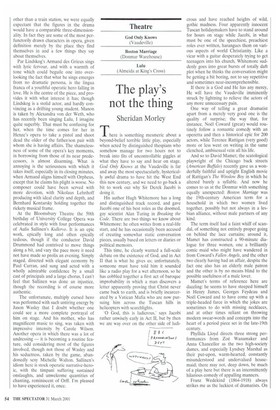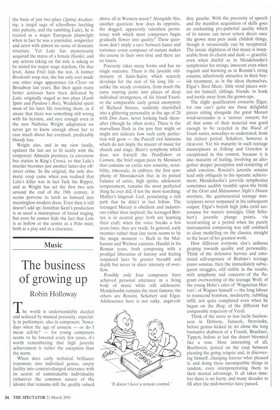The play's not the thing
Sheridan Morley
There is something mesmeric about a beyond-belief terrible little play, especially when acted by distinguished thespians who somehow manage for two hours not to break into fits of uncontrollable giggles at what they have to say and hear on stage. God Only Knows at the Vaudeville is far and away the most spectacularly, hysterically awful drama to have hit the West End this new century, and we need to go back a bit to work out why Sir Derek Jacobi is doing it.
His author Hugh Whitemore has a long and distinguished track record, and gave Jacobi one of his best roles as the doomed, gay scientist Alan Turing in Breaking the Code. There are two things we know about Whitemore: he often writes from a real-life start, and he has occasionally been accused of creating somewhat static conversation pieces, usually based on letters or diaries or political memoirs.
This time, he clearly wanted a full-scale debate on the existence of God, and in Act II that is what he gives us; unfortunately, someone must have told him it sounded like a radio play for a wet afternoon, so he has cobbled together a first act of baroque improbability in which a man discovers a letter apparently proving that Christ never came back to earth, and is briefly incarcerated by a Vatican Mafia who are now pursuing him across the Tuscan hills in helicopters with searchlights.
'0 God, this is ludicrous,' says Jacobi rather unwisely early in Act 11, but by then we are way over on the other side of ludi crous and have reached heights of wild, gothic madness. Four apparently innocent Tuscan holidaymakers have to stand around for hours on stage while Jacobi, in what must be one of the speechiest, preachiest roles ever written, harangues them on various aspects of world Christianity. Like a vicar with a guitar desperately trying to get teenagers into his church, Whitemore suddenly goes into great bursts of totally daft plot when he thinks the conversation might be getting a bit boring, not to say repetitive and sometimes near-incomprehensible.
If there is a God and He has any mercy, He will have the Vaudeville imminently struck by lightning to relieve the actors of any more unnecessary pain.
One way of telling a great dramatist apart from a merely very good one is the quality of surprise; the way that, for instance. Nod! Coward (great) would routinely follow a romantic comedy with an operetta and then a historical epic for 200 actors, while Terence Rattigan (very good) more or less went on writing in the same clenched, ambisexual vein all his life.
And so to David Mamet; the scatological playwright of the Chicago back streets (American Buffalo) recently gave us a wonderfully faithful and uptight English movie of Rattigan's The Winslow Boy in which he altered barely a syllable. And now he comes to us at the Donmar with something equally unexpected: Boston Marriage was the 19th-century American term for a household in which two women lived together, possibly but not always in a lesbian alliance, without male partners of any kind.
The term itself had a faint whiff of scandal, of something not entirely proper going on behind the lace curtains; around it, Mamet has constructed a 90-minute dialogue for three women, one a brilliantly comic maid who might have wandered in from Coward's Fallen Angels, and the other two clearly having had an affair, despite the fact one also has an elderly male patron and the other is by no means blind to the possible usefulness of a male lover.
Mamet's terms of reference here are dazzling: he seems to have steeped himself in Henry James, Georges Feydeau and Noel Coward and to have come up with a triple-headed farce in which the jokes are sometimes to do with missing necklaces, and at other times reliant on throwing modern swear-words and concepts into the heart of a period piece set in the late-19th century.
Phyllida Lloyd directs three strong performances from Zoe Wanamaker and Anna Chancellor as the two high-society dames, and especially Lyndsey Marshal as their put-upon, warm-hearted, constantly misunderstood and undervalued housemaid; there may not, deep down, be much of a play here but there is an intermittently hilarious comedy of appalling manners.
Franz Wedekind (1864-1918) always strikes me as the luckiest of dramatists. On the basis of just two plays (Spring Awakening, a turgid saga of schoolboys lurching into puberty, and the rambling Lulu), he is treated as a major European playwright when in fact he was a journalist, songwriter and actor with almost no sense of dramatic structure. Yet Lulu has mysteriously acquired the status of a female Hamlet, and any actress taking on the role is asking to be tested for major stage stardom. On that level, Anna Friel fails the test. A former Brookside soap star, she has only ever made one other stage appearance (in Closer on Broadway last year). But then again many better actresses have been defeated by Lulu: originally staged as two plays (Earth Spirit and Pandora's Box), Wedekind spent most of his later life rewriting them, as if aware that there was something still wrong with his heroine, and sure enough even in the new Nicholas Wright adaptation we never get to know enough about her to care much about her eventual, predictably bloody fate.
Wright also, and in my view fatally, updates the last act to fit neatly with the temporary Almeida premises, (a cavernous bus station in King's Cross), so that Lulu's murder becomes just another latter-day offstreet crime. In the original, the only dramatic coup came when you realised that Lulu's killer was in fact Jack the Ripper, and as Wright has set the first two acts around the end of the 19th century, it seems perverse to lurch us forward into meaningless modern dress. Even then it still doesn't add up: Jonathan Kent's production is as usual a masterpiece of broad staging, but even he cannot hide the fact that Lulu is as hollow at the centre as a Polo mint, both as a play and as a character.



























































































 Previous page
Previous page